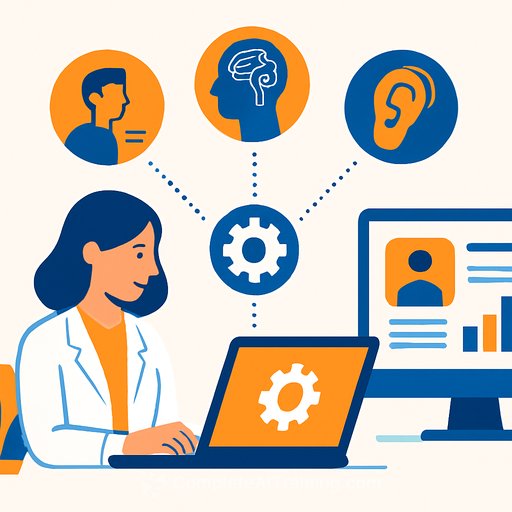Practice Management Software Roundtable: AI, Automation, and Analysis
Sep 2, 2025 | Office Management Systems
Summary
Experts from leading practice management software companies share how AI, automation, and advanced analytics are changing hearing care clinics. These technologies streamline workflows, improve patient communication, and boost business results.
Key Takeaways
- AI-driven features like speech-to-document tools, automated chart noting, and interactive texting reduce admin tasks and enhance patient engagement.
- Cloud-based platforms with integrated analytics and digital clinic tools give real-time insights, smoother communication, and more efficient operations.
- Future updates will focus on deeper AI integration, predictive analytics, and workflow automation to let clinicians spend more time on patient care.
Hearing clinic staff are benefiting from new features that save time and simplify daily tasks. As technology evolves, both clinicians and patients seek solutions that make their routines easier. Experts from Auditdata, Blueprint Solutions, CounselEar LLC, and Sycle discuss recent advancements and where the industry is headed.
Current Trends in Practice Management Software
Eric Copeland (Auditdata): Automation tools that reduce administrative work are a major trend. From scheduling to documentation and referral management, practices want systems that handle repetitive tasks quietly in the background.
Henrik Nielsen (Blueprint): AI is now integrated to automate everyday clinic activities. Features include AI-assisted chart noting with voice dictation, language translation, and text replies to patient messages—freeing staff for higher-value work.
Brian Urban (CounselEar): AI is enhancing clinical documentation, business metrics, and patient management, improving accuracy and efficiency.
Kelsey Wells (Sycle): Data use is expanding to help grow practices and improve patient retention. New analytics dashboards offer fresh, real-time insights into key business metrics.
Newest Features Helping Hearing Care Professionals
Copeland: Auditdata Manage’s AI-powered speech-to-document tool captures patient sessions and creates structured notes and management plans automatically. This cuts documentation time and improves record consistency and compliance.
Nielsen: Blueprint OMS now supports interactive texting from clinic landlines, complete with AI assistance and pre-defined messages. It also offers text-to-pay, appointment reminders, and telehealth invites via SMS.
Urban: CounselEar AI Assist is launching with a focus on clinical documentation, soon expanding to business metrics and patient management. Additional features include a full claims workflow, integrated online scheduling, and automated marketing.
Wells: Sycle’s new Digital Clinic features reduce paper clutter with electronic signatures, searchable files, and one-click document sharing. Their analytics tools provide an up-to-date view of clinic performance without relying on spreadsheets.
How Practice Management Software Has Evolved
Copeland: Early software mainly digitized paper processes—scheduling, scanned documents, basic recordkeeping—but didn’t actively improve efficiency.
Nielsen: Older systems were mostly local server-based and lacked integration with other tools like Noah or QuickBooks.
Urban: Features such as virtual superbills, automated communications, remote payments, and online document storage have significantly cut paper use.
Wells: Visual dashboards replaced outdated paper reports and static spreadsheets, making data easier to interpret and act on.
Future Features and Their Impact
Copeland: Practice management software will grow smarter and more integrated, especially with diagnostic tools, changing how care is delivered and clinics managed.
Nielsen: Given the shortage of hearing healthcare professionals, tools must support patient-centric workflows by combining documentation, engagement, billing, and analytics.
Urban: Expect more AI-driven tools aimed at reducing staff workload in patient management, documentation, and claims processing.
Wells: AI continues to evolve in practice management. Clinics can already start leveraging it to improve efficiency and patient care.
For those interested in how AI and automation can further enhance business operations and staff productivity, exploring specialized AI training can provide practical skills to integrate these tools effectively. Learn more about AI courses and certifications at Complete AI Training.
Your membership also unlocks:





